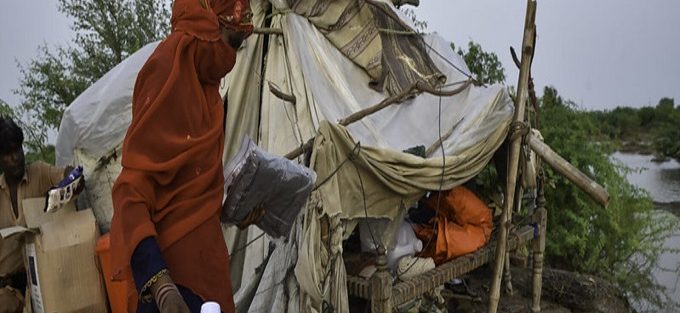Climate change has led to an unprecedented increase in the frequency and severity of natural disasters. While it is wreaking havoc worldwide, the impact on developing and underdeveloped countries is much more devastating.
The Global Climate Risk Index ranks Pakistan as the eighth most at-risk country in the world for extreme weather conditions due to climate change. The risks that Pakistan faces became evident when the country was hard hit by torrential rains and a combination of riverine, urban, and flash flooding in August 2022, resulting in an unprecedented disaster. This brought a new level of devastation as one-third of the country was under water, 33 million people were affected, 1700 people lost their lives and 7.9 million people were displaced.
It was during these times of despair that the power of philanthropy became evident.
Estimates reveal that in-cash donations for flood relief either pledged or collected, were over PKR 300 billion (around USD 1 billion) in Pakistan. These contributions were significant in providing relief, recovery and rehabilitation services to the affected people.
An overwhelming portion of the contribution consisted of in-kind donations from non-profit organisations and the corporate sector. For instance, Nestlé Pakistan distributed ten thousand litres of milk and two hundred thousand litres of water among those affected by the floods. In addition, Habib Bank Limited (HBL) provided over 7000 families with waterproof tents, mosquito nets and ration bags across the province of Balochistan1.
A huge number of individuals and organisations were seen volunteering their time to assist flood affectees. More than 500 employees were sent out by the Pakistan Red Crescent Society (PRCS) to assist flood victims. But before anyone’s help could reach the affected areas, the volunteers of local foundations like Akhuwat and Al Khidmat Foundation reached out to help the flood-stricken communities. These local foundations have efficient networks with a plethora of volunteers always at their disposal and extensive experience in disaster relief and response operations.
An interesting observation while analysing the response was the cooperation between corporations and non-profit organisations. While both stakeholders set up and managed their initiatives, a significant amount of relief and rehabilitation activities and programmes were run jointly, where corporations funded projects and non-profits implemented them. For instance, PepsiCo Pakistan under its nationwide ‘Millions of Meals’ programme delivered emergency food assistance of 5 million meals to flood-affected communities in partnership with organisations such as Rizq, Pakistan Poverty Alleviation Fund (PPAF), and Akhuwat.
Pakistan has more than 18,000 not-for-profit organisations, and they were the most agile, functional and organised medium for immediate relief in the affected areas. These non-profits are also supporting the rehabilitation and reconstruction of the properties and homes destroyed during the devastating floods. The Pakistan Centre for Philanthropy (PCP) Certified Organizations were seen as credible and trustworthy and people routed their immediate donations through them. PCP has been notified by the Federal Board of Revenue of the Government of Pakistan as a certification agency for NPOs. The certification entails a thorough and objective evaluation of an organisation against set standards aimed at promoting best practices among the non-profit sector in areas of internal governance, financial management and programme delivery.
PCP, being the only organisation in the country that generates knowledge and evidence on the state of philanthropy, has been carrying out research and studies to gauge the total giving in the country. The Centre published a study “The State of Individual Philanthropy in Pakistan: 2016”, that revealed how much people donate during times of disasters such as floods, earthquakes or pandemics. Another report published on diaspora philanthropy revealed that the Pakistani diaspora in the UK gives around £1.25 billion every year in charitable donations, especially in times of disaster.
PCP also conducts corporate philanthropy surveys to document giving. Recently, the Centre has published two Corporate Philanthropy Survey (CPS) reports: 2021 and 2022. The findings reflect that the corporate sector gave PKR 30 billion (USD 106 million) as philanthropic donations during those two years. These numbers reflect that the hike in the volume of donations was peculiar during the pandemic and disaster times, providing concrete evidence that the corporate sector stepped up to help the country in its most difficult times.
However, PCP has observed that there is a lack of coordination and some organisations work in silos. While some geographic areas of the country remain the focus of relief efforts, other regions are either completely missed out or could only receive inadequate assistance.
PCP, therefore, recommends that we brainstorm about ways to harmonise the efforts of NPOs in Pakistan to prevent duplication of efforts and to expand their outreach to neglected areas. In this regard, PCP is envisioning creating a dashboard that could meticulously profile the NPOs with their programmes and field areas. The aim is to ensure that the details are readily available for everyone to avail better opportunities for coordination and assistance. It will help generate integrated collaboration between stakeholders to support the widespread adoption of response towards disasters.
With an increase in the frequency of calamities, disaster philanthropy is going to play a significant role in helping communities cope with the aftermath of disasters. It is, therefore, high time that we discern ways to strengthen and institutionalise philanthropy during and post-disaster times. ______________________________________________________________________
1.Balochistan, along with the Sindh, were the most flood affected provinces.
Photo by European Union, 2022 (photographer: Abdul Majeed)
By Ms Shazia Maqsood Amjad, Executive Director of Pakistan Centre for Philanthropy
Visit the article site: https://members.wingsweb.org/news/614044



